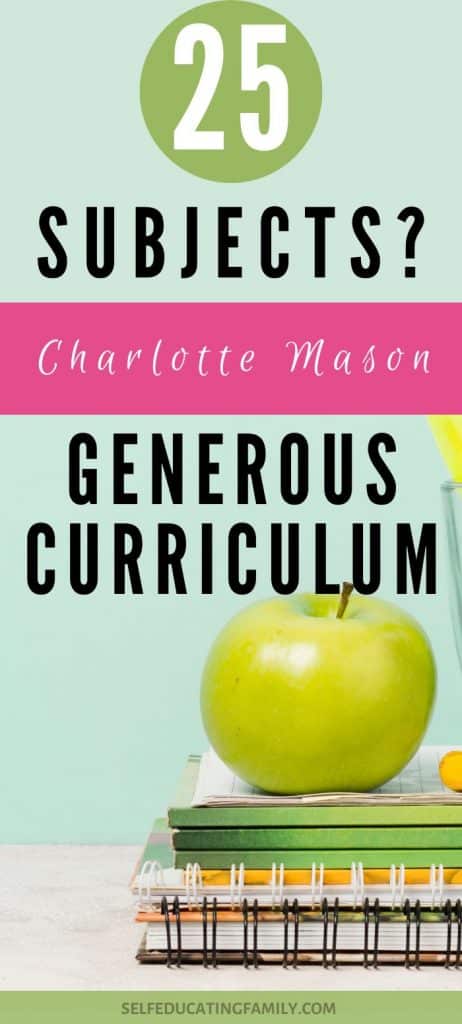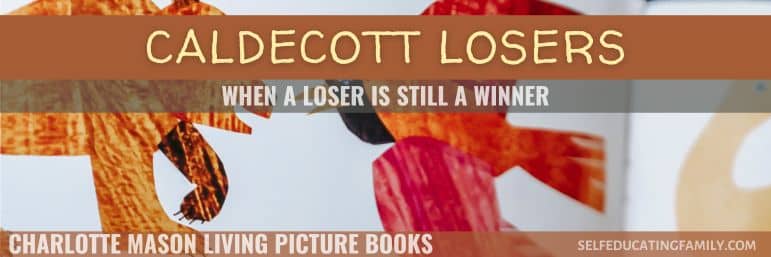What’s inside: Charlotte Mason Homeschooling provides a living feast of education that will help your children thrive. Using tried and true methods, Charlotte Mason suggests a generous curriculum full of living books and many topics. Sometimes, the curriculum you end up with is overwhelmingly generous. Here’s how to incorporate these methods and subjects today with recommended tips & strategies.
This post may contain affiliate links. If you find my content valuable and make a purchase through one of my links, I will earn a commission at no cost to you, which helps me keep this blog going so I can help you even more! I recommend products I trust and/or use myself, and all opinions I express are my own. Read the full disclaimer here.
Charlotte Mason Homeschooling
Charlotte Mason ran the Ambleside schools in the early 1900s. She also had teacher training schools and wrote several books including The Home Education Series. It’s primarily through these writings that today’s homeschooling movement has embraced the methods of this 19th century educator.
Homeschooling books which modernize on Charlotte’s methods include Karen Andreola, Karen Glass, Susan Schaeffer Macaulay, and Leah Boden, among others. By “modernize,” I mean “putting her ideas into modern English. While I enjoy the old-fashioned language, many people prefer modernizations. You can also find both the original version and a modernization at Ambleside Online.
All in all, Charlotte’s methods lead to a very generous curriculum. Sometimes, it’s overwhelmingly generous.
Tips for a Generous Curriculum
Here are lessons learned from our homeschooling with Charlotte Mason methods in trying to fit such a generous curriculum into my day. This is a follow-up to my guest post over at Homeschool.com on Evaluating your Charlotte Mason Homeschooling.
Charlotte Mason (CM) homeschooling is about methods and principles. Any CM curriculum is crafted with these in mind but it is up to you, the parent, to implement the methods.
A Generous Curriculum
If you have trouble fitting the various subjects into your day, I want to encourage you to be mindful of your approach.
“Quick” list of possible subjects in Charlotte Mason homeschooling
.
- Bible *
- Math *
- Literature *
- History *
- Science *
- Copywork
- Recitation
- PE Physical Education
- Biography *
- Poetry
Subjects
- Grammar / Composition
- Foreign Language *
- Geography * / Map skills
- Citizenship *
- Government / Economics *
- Current Events
- Nature Study
* = subjects that often use Narration
The Dailies
Some subjects must be done daily. Math, reading, recitation or memory work. These are all subjects that require daily exercise of your brain.
Whatever your “Must-Do-Daily” list is, be sure to finish it early in the day. It’s non-negotiable. Keep the lessons short and build the routine of moving simply and efficiently from one subject to the next.
Build these habits to help make dailies go smoothly
- Attention
- Orderliness
- Self-control
The Afternoons
The afternoons are designed to be open and unscheduled precisely. This doesn’t mean your child should play video games and be otherwise idle. You want “structured free time”.
Some subjects are perfect for afternoons
Being outdoors is a key component of the afternoons. Physical Education (PE) and Nature Study are two subjects that work perfectly outside. Field trips are also good for the afternoons, as are hikes.
Many of the Charlotte Mason school programmes (back in the early 1900’s) left afternoons free for useful work, like gardening, making models, or working on a term-long project like a sewing project to give to those who were in need. We call this subject Handicraft, which is also ideal for work in the afternoons.
What about all those other subjects? Where do they fit into my day?
In Charlotte Mason homeschooling, there are a bunch of “subjects” that can be baffling if you are new to her methods, like “Folk Song”, “Recitation”, “Copywork” or “Artist Study”.
Some subjects are methods
Some “subjects” really are methods.
Intuitively, you can see that recitation could be linked to Poetry, hymn study, or even Shakespeare. Copywork could come from any subject with a living book – Literature, History, Biographies, even math or science for fun or to change things up. I haven’t listed Narration as a separate subject since it is another method used in many subjects.
For these method/subjects that are linked to other subjects, then just treat them as a single subject. For instance, literature would include reading, narrating and doing copywork. Eventually, literature includes recitation and written composition, which are later stages of narration.
Some subjects are very short
Certain subjects are much simpler than they appear.
Artist study takes 5-10 minutes once a week. Simply stare at the artist print for 2 minutes trying to take in every detail, flip it over and then describe what you remember. You should do this along with your kids since it’s good to model the task. Flip it back after your narration to see how you did. Then hang that picture on the wall for that semester as you study that artist.
Yes, you can vary this by giving biographical background on the artist or the artwork, you can change your “narration” to emphasize colors or shapes. You could even try sketching what you remember. But essentially, artist study takes up very little time.
Short subjects include:
- Artist Study
- Composer Study
- Recitation
- Poetry (e.g. just read one poem together for the week – don’t pick Idylls of the King)
- Hymns
- Folksongs
Another tool: A Co-op
Working together with one or more other families can be a great way to get some of the weekly subjects done. We’ve used a co-op for many years with anywhere from one to six other families. In those, we covered as many as 6 and as few as 1 subjects (Shakespeare, since it works well in a group.)
Some subjects are good for groups
Some subjects work really well in groups.
- Recitation – because you have an audience
- Shakespeare – because you can have multiple readers and/or actors
- Hymns & Folksongs – because it’s more fun to sing in a group
- Handicraft – because your child can get more exposure through the talents and resources in other families – just because you can’t teach knitting, doesn’t mean that someone in your group couldn’t!
Here are some tips for group learning:
- Find other families who use or are learning CM methods and principles
- Include subjects that you all want to cover
- Try not to do too much
- e.g. Composer study. Rather than giving a lecture on Strauss, just play the music. It can play in the background of handicraft.
Morning Basket

Right after breakfast cleanup is a great time to work together as a family using a morning basket.
Morning basket usually includes your family read-alouds. But it doesn’t have to be the same book every day. You are allowed to read more than one book at a time and you don’t have to finish them in one day. In fact, most books in Charlotte Mason homeschooling are read over a period of time in order for the reader/listener to digest the book.
We also included memory work and even our study of Latin Roots, which were on flash cards, because we were all learning the Latin roots together.
Include any subject you all do together.
Loop Scheduling
What is loop scheduling? You can use Loop scheduling for weekly subjects or subjects that you find yourself skipping too often due to time constraints.
To make a “loop,” select 4-10 subjects and write it on a list.
- Schedule the loop – plan on doing something from the list everyday or 3 times a week – whatever. As long as you do something from the loop regularly.
- If your list on your loop is “A, B, C, D,” then today you do A, tomorrow you do B, the next day you do C and the next you do D. The day after that, you do A again and start all over. That’s why it’s called a loop. You keep looping through the list.
- Continue looping through your list every day.
- This is how all subjects from the list get covered regularly.
Sonya Shafer from Simple Charlotte Mason responded to “the challenge of a generous curriculum” and said, “The answer to that extreme is to keep in mind that Charlotte did not do every subject every day. She kept variety in the schedule. Those subjects were all presented some time during the weeks of the term, but not every one every day.”
Habit Training
Habits help you do things automatically. You will always have habits. You can choose to develop good habits to prevent bad habits from becoming… well, habits.
Spending time deliberately training habits, especially in young people, can help your days to go smoothly. Work on one habit a month or a semester together as a family. Or focus on basic habits for your younger learners and more advanced habits as they get more mature.
Adjusting the Book list
Cutting out some books can be a viable choice depending on your circumstances. I’m not saying cutting out entire subjects, just trimming the book list. Because sometimes there are too many books to finish.
Adjusting for slower readers
You may have to adjust your expectations for slow readers or even for personal tastes.
I had 3 children with 3 different reading speeds. One was a naturally fast reader, one a naturally slower reader, and one dyslexic. I had to adjust my expectations and techniques.
So keep in mind that you may need to adjust for slower or less-enthusiastic readers.
One thing we did to improve everyone’s reading was speed reading. My twins learned speed reading in 9th grade and my younger in 6th. We found it tremendously helpful.
- For my 9th graders, it increased fluency by 2x and 3x.
- For my 6th-grade dyslexic reader, it also increased fluency.
We used a free online speed reading tool with a classic text found on Project Gutenberg. I would test their reading comprehension to make sure they were speeding up but not losing understanding.
If you try this, be sure to use materials at least 2 or 3 grades below their current reading level to increase fluency.
Adjusting for tastes
I know this is a bit shocking, but not everyone likes a book just because it is a living book. Your “required” book might not be right for your family.
You have to figure out what works for your family. For instance, my boys didn’t like Pinocchio or Watership Down. So we choose other books.
There are plenty of living books out there. From preschooler “read alouds” all the way through high school.
However, don’t just cut a book because it’s “too hard” – it’s OK to read hard books. You need to challenge your kids appropriately. But regular tears usually indicate a bigger issue than just one book.
So, don’t be afraid to trim the book list – not the subject list – just the book list.
In Summary
Charlotte Mason homeschooling ends up being quite rigorous and students quite accomplished when they get a generous curriculum. Learn more about CM’s educational philosophy and read more quotes from CM to inspire you.

Keep on Learning
Related Posts








